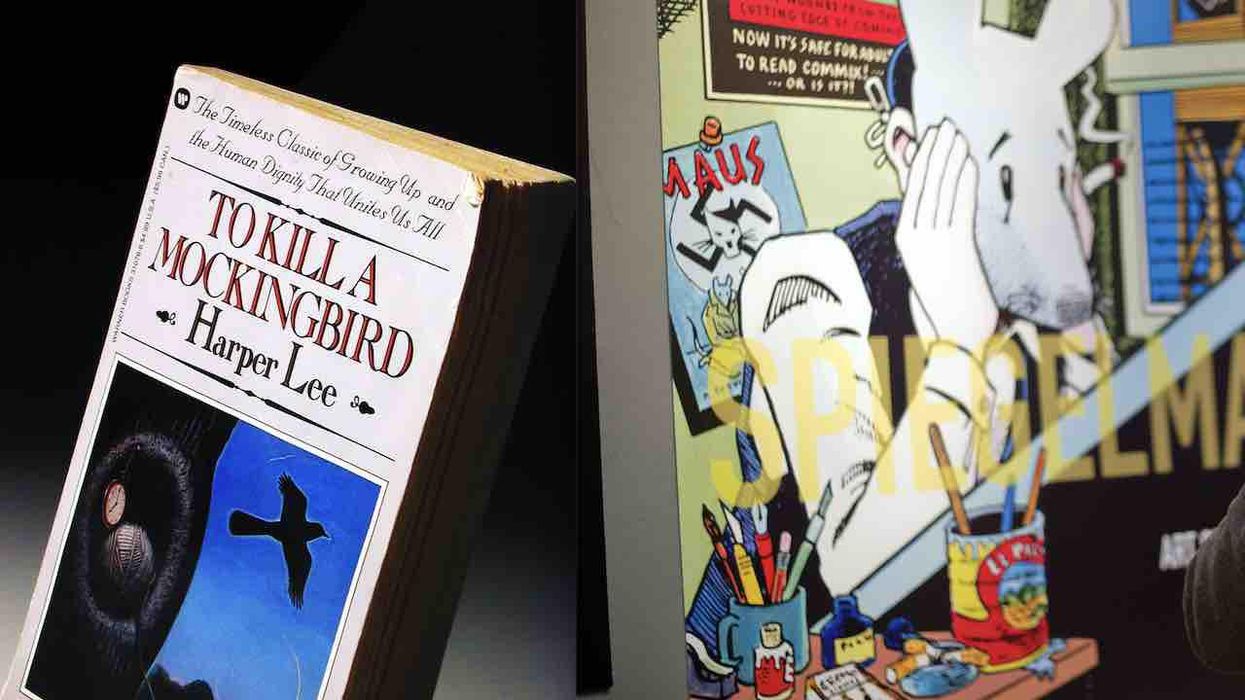
Photo by Nate Parsons/The The Washington Post via Getty Images (left); Photo by BERTRAND LANGLOIS/AFP via Getty Images (right)

Two acclaimed books were removed from curriculums by two school boards this month.
The Mukilteo School Board in Washington state unanimously approved a resolution Monday to remove "To Kill a Mockingbird" from the required reading list for ninth-grade English/Language Arts, KING-TV reported.
And the McMinn County Board of Education in Tennessee voted unanimously Jan. 10 to remove "Maus" — a graphic novel about the Holocaust — from the district's curriculum, NBC News reported.
As for "To Kill a Mockingbird," KING said at least one parent raised concerns that Harper Lee's classic novel is racially insensitive. Interestingly the station emphasized that the novel "remains on the district-approved list and is not banned."
District spokesperson Diane Bradford said in a separate KING story that "if a teacher really wants to continue to teach it in their classroom that would be their option because it would remain on the approved novels list. Students who find the material offensive can opt out."
"To Kill a Mockingbird" focuses on a black man wrongly accused of raping a white woman in the Jim Crow-era south. The classic novel won a Pulitzer Prize and has been studied in schools ever since its 1960 publication.
However, the school board received a request to remove the book from the curriculum since the "N-word" appears over 50 times "with no context about its negative connotations," KING reported, adding that the complaint also says "To Kill a Mockingbird" marginalizes characters of color and celebrates "white saviorhood."
Superintendent Alison Brynelson supported the novel's removal from the required curriculum, the station said, citing the Jan. 24 school board agenda.
The Instructional Materials Committee — which consists of about 20 teachers, librarians, administrators, and parents — recommended the change, KING said. And while about 63% voted to remove the book from the required reading list, 68% voted to not remove the book from the approved novels list, the station added.
As for "Maus," the sticking points were eight instances of profanity and an image of a nude woman, NBC News said.
Cartoonist Art Spiegelman's graphic novel is about his Jewish parents' experiences in Nazi concentration camps, the network noted, adding that the school district was looking to use the 1992 Pulitzer Prize-winning novel as an "anchor text" for eighth graders studying the Holocaust.
Board member Jonathan Pierce described himself as "probably the biggest sinner and crudest person in this room" but said the book didn't meet his "standard," which he described as, "Can I lay that in front of a child?" NBC News said.
Pierce added that children "need" to know about the Holocaust and the "suppression of certain ethnicities. It's not acceptable today. We've got to accept people for who and what they are. I’m just an old country school board member, and I think in our policy it says the decision stops with this board," the network reported.
The nude image in "Maus" depicts the dead body of Spiegelman's mother, who took her own life in 1968 at age 56, NBC News added.
Board member Tony Allman brought up Spiegelman's freelance cartoon work for "Playboy" and said, "You can look at his history, and we’re letting him do graphics in books for students in elementary school. If I had a child in the eighth grade, this ain’t happening," the network said.
NBC News said another board member asked if vulgarities could be stripped from the graphic novel for student use, but a district lawyer said such an action could go beyond the "fair use umbrella" and suggested contacting the author for permission.
Spiegelman called the removal of his book "Orwellian," the network said, citing a CNBC report.
But Christopher F. Rufo posted a thread on Twitter about the "Maus" controversy and provided images purportedly of McMinn school board minutes. In one image, board member Mike Cochran offers a detailed, nuanced argument for removing "Maus." In a second image, board member Rob Shamblin asks "if ['Maus' has] been removed, it could be added back if there's no better alternative, I assume? I don't know what it's going to take to find an alternative." Sharon Brown, school board chair, replies that "it would probably mean we would have to move on to another module."
Are both school boards right about their decisions? Are they both wrong? Is "Maus" legitimately problematic for young readers' eyes? Or is it actually "To Kill a Mockingbird" rightfully on the outs? Or does it all come down to sociopolitical views and regional biases?
One Twitter commenter called the "To Kill a Mockingbird" removal "absurd," adding that "art should be challenging, forcing the reader to think." But one Mukilteo district teacher in favor of removing the novel said students shouldn't have to “endure embarrassing and offensive language,” and a student added that "it’s hurtful and it’s harmful" to be forced to "sit in that classroom and read derogatory terms."
It's worth noting that news organizations appear to be reporting the removal of "Maus" a bit differently — and with different energy — than the removal of "To Kill a Mockingbird."
A Google search Thursday afternoon for "maus banned" returned 22,300 items under the "news" subcategory. And nearly all the news stories on the first page, sorted by relevance, use a form of the word "ban" in their headlines.
Conversely, a Google search Thursday afternoon for "to kill a mockingbird banned" returned far fewer items — 8,040 — under the "news" subcategory. And hardly any of the news stories on the first page, sorted by relevance, use a form of the word "ban" in their headlines.
Here's Spiegelman speaking to CNN:
Art Spiegelman on his reaction to Tennessee school board banning his Pulitzer-winning Holocaust book \u201cMaus.\u201d\n\n\u201cI moved past total bafflement to trying to be tolerant of people who may possibly not be Nazis, maybe.\u201dpic.twitter.com/kuwN2RLOZE— The Recount (@The Recount) 1643289572